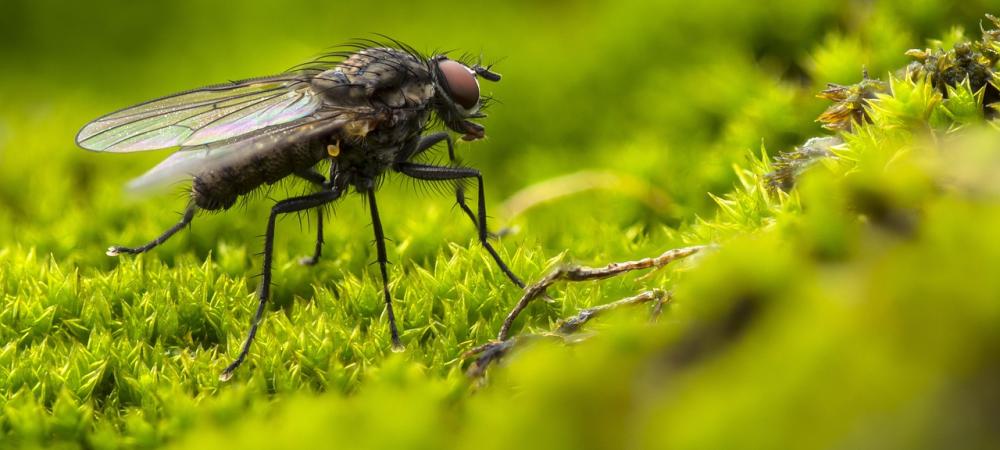Black Fly Season in Canada

As spring warms the Canadian landscape, there's a hidden menace that comes out of hiding—the black fly. These tiny pests are infamous for their persistent biting and their ability to ruin outdoor activities. If you’re a homeowner in Canada, understanding when black fly season hits, how to protect yourself, and what to do if you’re bitten can make all the difference in keeping your outdoor experience enjoyable.
What Are Black Flies?
Black flies, also known as buffalo gnats or simply "biting midges," are small, dark-colored insects that can cause significant discomfort to anyone spending time outdoors. Adults range in size from about 1/8 inch to 1/4 inch long. They are often dark or black in color, with their wings appearing to be slightly transparent. One of the most noticeable features of black flies is their stout, hunched-back appearance, which makes them look almost "fuzzy" when viewed up close.
Are Black Flies Dangerous?
While black flies can be irritating and their bites uncomfortable, they are generally not considered dangerous to humans. However, there are a few important points to consider:
- Allergic Reactions: In some rare cases, black fly bites can trigger severe allergic reactions. This might include swelling beyond the bite area, difficulty breathing, or anaphylaxis (though this is extremely rare). If you experience any of these symptoms, it’s important to seek medical help immediately.
- Transmission of Diseases: While black flies are not typically known to transmit diseases to humans in Canada, they are known to carry and transmit certain diseases to animals, such as the “black fly fever” in cattle.
In very specific areas, they have been implicated in the transmission of diseases like Onchocerciasis (river blindness) in tropical regions. However, these diseases are not common in Canada. - Infection Risk: If black fly bites are scratched excessively, there is a risk of secondary infections, especially if dirt or bacteria enters the bite area. To avoid this, make sure to clean the bite area thoroughly and avoid scratching.
While black flies are not deadly or overly dangerous, their bites can certainly be a nuisance. For the most part, preventing bites and treating them quickly is the best course of action.
Do Black Flies Bite?
Yes, black flies do bite, and their bites can be quite uncomfortable. The females of the species are the culprits, as they require a blood meal to lay eggs. Black flies use their specialized mouthparts to pierce the skin of their hosts (including humans) and feed on blood.
- How do they bite? Female black flies land on exposed skin, usually around the face, neck, arms, and legs, and use their mouthparts to pierce the skin. Once they have attached, they may stay for several minutes, feeding on blood before flying off.
- What does a bite feel like? The bite itself can cause a sharp, stinging sensation, though some people may not feel it at all until after the fly has flown away. Once bitten, the skin typically becomes red, swollen, and itchy, similar to a mosquito bite.
- How to minimize bites? As mentioned earlier, wearing long sleeves, pants, and using insect repellents can help reduce the chances of getting bitten. Black flies are most active during the daytime, so be extra cautious during their peak hours.
What Attracts Black Flies?
Black flies are attracted to certain conditions, especially near running water. Here's what draws them in:
- Flowing Water: Black flies need running water to breed, as their larvae develop in these habitats. They are often found around rivers, streams, and creeks, as well as wet, marshy areas. Water with fast-moving currents is especially appealing.
- Carbon Dioxide: Like many biting insects, black flies are attracted to carbon dioxide (CO2) emitted from the breath of mammals, including humans. The more CO2 you exhale, the more likely they are to hone in on you.
- Body Heat: Black flies are also drawn to heat, so they’ll target areas of your body that are warm, such as your face, neck, and arms.
- Sweat and Body Odors: The scent of sweat and natural body odors can also attract black flies. Their keen sense of smell helps them find their next meal!
- Dark Colors: Black flies are attracted to dark colors. While light-colored clothing can help make you less attractive to these pests, wearing darker hues might draw them in more.
What Do Black Flies Look Like?
At first glance, black flies can seem similar to mosquitoes, but there are key differences. Adult black flies are small and dark-colored, usually ranging from black to dark gray, with some species having a slightly iridescent sheen.
- Size: They’re generally between 1/8 inch and 1/4 inch long, making them noticeably smaller than mosquitoes.
- Wings: The wings are broad and have a slight translucent or smoky appearance. If you look closely, you might see a pattern of veins running through them.
- Body Shape: Their bodies are stout and humped, which is one of their more distinguishing features. Unlike mosquitoes, they don’t have long, slender bodies.
- Mouthparts: Female black flies have a specialized mouthpart designed for biting and piercing skin to feed on blood. You’ll notice them crawling around your skin before they latch on to bite.
When is Black Fly Season in Canada?
Black fly season in Canada typically begins in late spring, often around May or early June, and can last for several weeks depending on your region. The season peaks around mid-to-late May, when black flies are most abundant. However, the exact timing can vary, especially in different parts of the country.
- Eastern Canada (Ontario, Quebec, Atlantic provinces): Expect black flies from late April to June, depending on weather conditions.
- Western Canada (British Columbia, Alberta, Saskatchewan): Black flies can be active from May through early July in areas with running water.
These flies are most active during warm, sunny days, especially in the early morning and late afternoon when the temperatures are mild. They tend to thrive in areas with dense vegetation and near water sources.
How to Protect Yourself from Black Flies
Living in Canada means you have access to some of the most beautiful natural landscapes in the world, but it also means you have to contend with black fly season. Here are some practical tips for homeowners to reduce the impact of black flies:
- Avoid Peak Activity Times: Black flies are most active during the day, especially in the early morning and late afternoon. Plan your outdoor activities for the evening or early morning when they are less active.
- Dress Appropriately: Wear long-sleeved shirts, pants, and hats to minimize exposed skin. Light-colored clothing is recommended because it is less attractive to these insects.
- Use Repellents: Apply insect repellents containing DEET or Picaridin to exposed skin, or use natural repellents such as citronella or eucalyptus oils. Be sure to follow the manufacturer’s instructions for safe application.
- Create Physical Barriers: If you’re planning to spend time outdoors, especially near water, consider using fine mesh nets or head nets to protect your face and neck.
- Install Screens: Keep your windows and doors closed or install high-quality mesh screens to prevent black flies from entering your home.
- Manage Standing Water: Black flies breed in running water, so eliminating standing water near your property won’t help with black flies, but removing stagnant water sources like puddles, birdbaths, and clogged gutters will reduce other pests.
- Natural Repellents and Traps: In addition to chemical repellents, natural oils like lavender and tea tree can deter black flies. Some homeowners also use traps or decoys like sticky fly traps or DIY garlic sprays.
What to Do If You’re Bitten
Despite your best efforts, you may still fall victim to a black fly bite. The bites typically cause irritation, itching, and swelling. Here's what you can do to manage the symptoms:
- Clean the Bite: Wash the area with soap and water to reduce the risk of infection.
- Apply Cold Compresses: A cold compress can help reduce swelling and alleviate itching.
- Use Anti-Itch Creams: Over-the-counter hydrocortisone creams or antihistamine creams can reduce inflammation and itching.
- Take Antihistamines: For more severe reactions, oral antihistamines can help control the itch.
- Seek Medical Help: If you experience symptoms like difficulty breathing, excessive swelling, or a fever, seek medical attention immediately, as these could be signs of a more serious allergic reaction.
The Role of Black Flies in the Ecosystem
While black flies are a nuisance to humans, they play an important role in the ecosystem. They serve as food for a variety of birds and fish, which rely on these insects for sustenance. Additionally, their larvae help decompose organic matter in freshwater ecosystems, contributing to nutrient cycling.
However, if their presence on your property becomes unbearable, it's best to consult a local pest control company like Innovative Pest Solutions that can help assess the situation and offer environmentally friendly solutions for managing these pests.
Getting Rid of Black Flies
Black fly season is a part of Canadian life, but it doesn’t have to ruin your summer. With the right knowledge, protection, and preventive measures, you can minimize the effects of black flies and enjoy all that the outdoors has to offer. Whether you’re hosting a backyard BBQ, hiking through the forest, or simply relaxing by the lake, these simple tips can help you stay bite-free and enjoy the beauty of nature without the annoyance of black flies.
If you need assistance with controlling black flies or other pests around your home, don’t hesitate to contact your local pest control professional. We can provide tailored solutions to keep your home safe and comfortable year-round.
Stay safe, and enjoy the season!
Sources:
